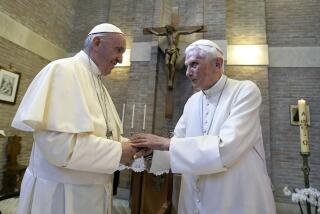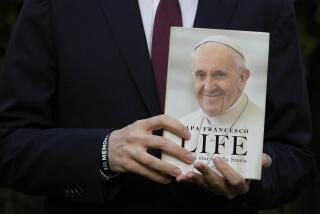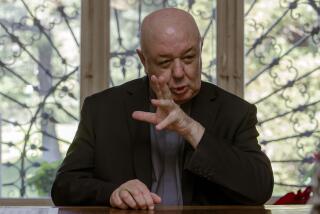Retired Pope Benedict reemerges to step into the roiling clergy sex abuse debate
The former Pope Benedict XVI receives visitors at his secluded residence in the Vatican’s gardens, but if they gripe about his successor, Pope Francis, he is said to have a way of changing the subject.
“Various people have told me Benedict’s reply to criticism of Francis is, ‘Let’s pray,’” said Sandro Magister, a Vatican expert at Italy’s L’Espresso magazine.
When in 2013 Benedict became the first pope in 600 years to resign, citing health reasons, he promised to stay “hidden from the world” at his new home, a former monastery close to a wooded area overlooking Rome that he shares with nuns who cook and clean for him.
But Thursday, the 91-year-old German native released an incendiary essay blaming the sexual abuse crisis plaguing the church on the sexual revolution of the 1960s, which he said triggered an erosion of rules and morality in the church.
The essay was seen by many as undermining Pope Francis because it constitutes a major statement on the crisis despite Benedict’s vow to remain in the shadows.
It has also caused shock waves in the Catholic Church because Francis has chosen to blame abuse on priests exploiting their power, rather than on any moral collapse within the church. The latter is an argument favored by Francis’ opponents, who believe he is contributing to a decline in moral values by showing greater tolerance of homosexuality and pushing to offer communion to divorcees who remarry outside the church.
“The release of this letter has been schismatic in effect, if not in intention,” said Austen Ivereigh, who has written a biography of Francis.
That would be quite a reversal for Benedict, who told an interviewer in 2016 that he had never enjoyed telling others what to do.
“Taking decisions is possibly my weak spot,” said Benedict, who had proved his scholarly leanings by announcing his retirement to the world in Latin. “In truth I am more of a professor who reflects and meditates on spiritual questions.”
His departure announcement brought an end to an eight-year papacy in which he struggled to rein in the Vatican’s dysfunctional bureaucracy. In retirement, he has worked on his Mozart at the piano, read the Vatican’s daily newspaper and tended his vegetable patch.
In 2016, Pope Francis said he had heard that conservatives angered by his mercy-before-dogma papacy style had complained to Benedict, but claimed his predecessor “kicked them out.”
He described Benedict as a “wise grandfather” who “watches my back” with his prayers.
Three years on, however, the new essay casts him less as a kindly old grandpa and more like a curmudgeon still fuming about the ’60s.
Benedict outlines a disturbing series of changes he saw in his native Germany at the time, including the rise of sex education in schools and risque clothing that could provoke “aggression” among the young. He claims the sexual revolution was a slippery slope to acceptance of pedophilia.
“Part of the physiognomy of the Revolution of ’68 was that pedophilia was now also diagnosed as allowed and appropriate,” he wrote.
The “dissolution of the moral teaching authority of the church,” quickly followed, he claimed.
“The extensive collapse of the next generation of priests” was a result, he argues. “Why did pedophilia reach such proportions?
“Ultimately, the reason is the absence of God.”
Pinning the blame for priestly pedophilia on flower power lies in stark contrast to Francis’ belief that predator priests are driven by a temptation to cruelly exploit the power they wield over vulnerable young worshipers who trust them, combined with a sense of impunity — a phenomenon he calls “clericalism.”
In the essay, Benedict faults the church’s legal system for making convictions of offenders “hardly possible,” a possible attempt to explain the lack of punishment handed out to many abusers during his time as pope and at the Vatican’s Congregation for the Doctrine of the Faith, before he became pope in 2005.
Pope Benedict took action on sex abuse, but some say not enough »
But a main aim appears to be showing how a church without a moral compass has become “some kind of political apparatus,” where “the Eucharist is devalued into a mere ceremonial gesture.”
As an apparent jab at Francis’ papacy, it was music to the ears of the conservative Catholics.
“Benedict sees the church is losing its capacity to tell good from evil and he is warning Francis,” said Sandro Magister. “He kept quiet but has had enough and has decided to speak up.”
The conservative U.S. archbishop of Philadelphia, Charles Chaput, said the essay contained “moments of insight and genius that fall like rain in a desert.”
Despite the pledge to stay “hidden from the world,” there have long been signs Benedict is not ready to vanish completely, starting with his surprising decision in 2013 to continue wearing papal white and call himself “pope emeritus,” instead of “emeritus bishop of Rome.”
In 2016, he gave an interview focusing on God’s mercy, just as Francis was celebrating a Jubilee year dedicated to the concept of mercy.
A year later, Francis’ foes cheered when Benedict compared the church to a boat “almost filled to capsizing” in a message delivered on his behalf at the funeral of German Cardinal Joachim Meisner, one of four cardinals who publicly challenged Francis over his loosening of the rules on communion.
The prefect of the pontifical household, Archbishop Georg Gänswein, who is also Benedict’s long-time personal secretary, drew gasps when he said in 2016 that while Francis might be pope, there was “de facto an expanded ministry — with an active member and a contemplative member,” a reference to Benedict.
One Vatican expert suggested Gänswein had had his hand in the release of the essay.
“Gänswein is known for his very conservative leanings,” said Massimo Faggioli, professor of historical theology at Villanova University. “There is a parallel court at the Vatican which is out of control.”
Author Ivereigh said Benedict might have been persuaded by conservative backers to issue the essay.
“The proof is it was sent to right-wing publications,” he said, adding, “There is the idea Benedict is easily manipulated. It would be typical of him to go along with pressure.”
Conservative Vatican expert Marco Tosatti countered that there was nothing underhanded about publishing the essay, pointing out how Benedict states in his introduction he prepared it as a contribution to a bishops’ summit on sex abuse held at the Vatican in February.
“The real question is, should it have been given to the bishops at the summit, and if so, why wasn’t it given to them? Moreover, Benedict tells us Francis told him it was OK to publish the essay, and I think that they both share the same view on the 1960s,” he said.
“The only people who are nervous about this essay are the liberals who surround Francis,” he added.
Kington is a special correspondent.
More to Read
Start your day right
Sign up for Essential California for news, features and recommendations from the L.A. Times and beyond in your inbox six days a week.
You may occasionally receive promotional content from the Los Angeles Times.






